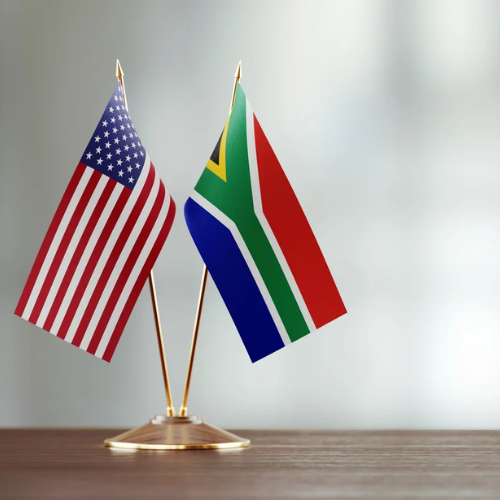South Africa and the United States used to be strong partners. They worked together on trade, security, and development. But now, things are changing—and not for the better. The US is growing unhappy with some of South Africa’s recent choices, especially when it comes to the countries it supports and how it handles certain issues at home.
One major problem is South Africa’s growing ties with countries like Russia, China, and Iran. The US sees these nations as rivals or even threats. When South Africa started working more closely with them, alarm bells rang in Washington.
South Africa also took a bold step by bringing a legal case against Israel at the International Court of Justice. That move angered many in the US, especially because it was so public and high-profile. Some American leaders see it as the country picking sides in a sensitive global conflict.
In response, a Washington-based group with influence in US politics has warned that serious punishment could be coming South Africa’s way. They are talking about sanctions—economic penalties that can hurt a country’s economy. One of the harshest penalties being discussed is kicking the country out of SWIFT.
That’s the system that allows banks around the world to send money to each other. If South Africa is removed, it could be blocked from doing business with other countries. This same move was used against Russia in 2022 after its invasion of Ukraine.
A well-known policy advisor from the US says that full sanctions are “on the table.” He prefers more targeted penalties—like freezing the bank accounts of certain government officials—but warned that larger actions could come if the situation gets worse.
New Bills, New Fears: Legal Pressure from Washington
In Congress, American lawmakers are pushing new laws that could directly impact South Africa. One of these laws would require the US government to study South Africa’s top leaders, especially those accused of corruption or human rights abuses. If the law passes, these individuals could face travel bans, frozen assets, and even public shame.
Another proposed law is causing even more debate. It’s aimed at protecting Afrikaans-speaking people in South Africa. The US bill suggests giving them special refugee status, saying they are an ethnic group “under threat.” This idea comes after concerns about land reform in the country, where land can be taken by the government without paying the current owners. Some Americans believe this law targets white farmers unfairly, and they say it could lead to violence.
South Africa’s government strongly disagrees. They say the law is fair and is only used when it helps the public. Officials also say no land has actually been taken in the last year, even though the law has been in place. Crime reports also show that farm attacks are a small part of overall crime in the country. Still, some groups continue to share stories that paint South Africa as dangerous for certain communities, adding fuel to the fire.
This legal back-and-forth has made things worse between the two countries. South Africa says the US is using fake stories and one-sided opinions. But in Washington, lawmakers feel South Africa is no longer acting like a trusted partner.
The G20 Snub and Mixed Messages
The tension became even more visible when the US president said he would not attend the upcoming G20 summit in Johannesburg. The G20 is a group of the world’s biggest economies. Their meetings are important for global decisions on trade, climate change, and development.
By skipping the event, the US is sending a loud message. The president also said the US has already pulled some of its financial help from South African programs. In a social media post, he accused the South African government of encouraging violence and targeting white farmers. His post was fiery and emotional, showing just how angry he is about the situation.
Still, in an unexpected twist, the US leader also lowered tariffs—taxes on goods—on South African exports. Products from South Africa that used to face 30% tariffs will now only face 10%. This move confused some experts. They say it might be a strategy to apply pressure without causing a total collapse in trade.
Even though trade may still continue, the message is clear: the US is tightening its grip. From possible sanctions and spying accusations to skipped summits and bitter debates, the relationship between the two countries is under heavy strain.


